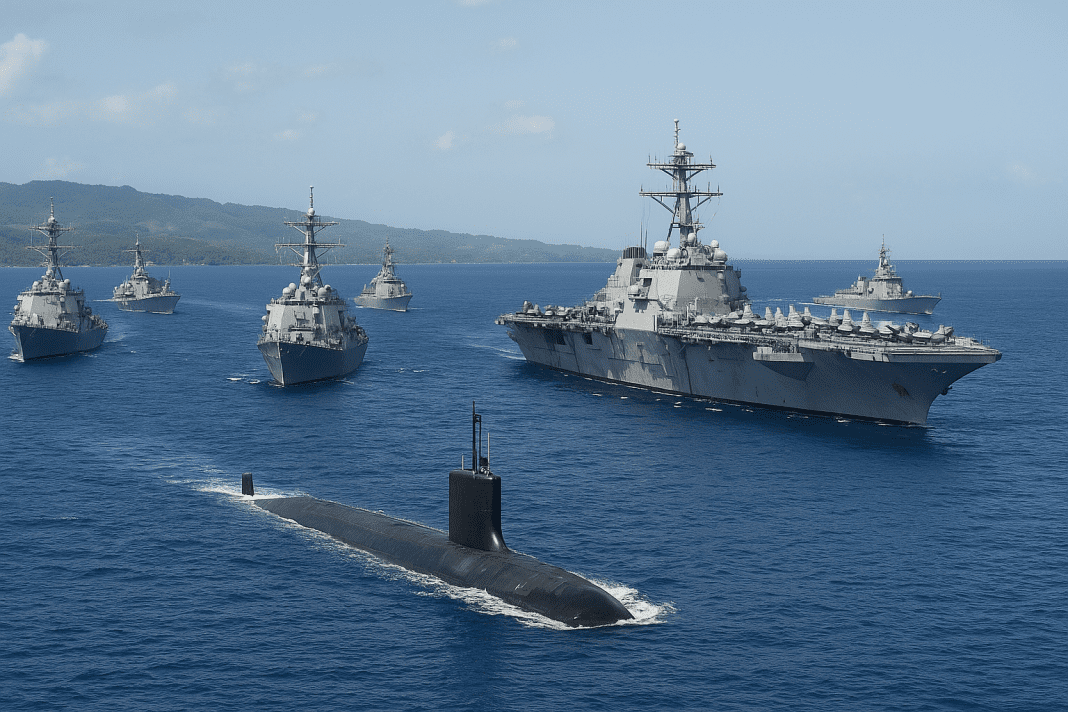The United States has sent one of its biggest military deployments in recent years to the southern Caribbean, right off the coast of Venezuela. A flotilla of seven American warships, including three guided-missile destroyers, is now patrolling the waters. Alongside them sails a nuclear-powered fast attack submarine, a vessel designed for stealth and heavy firepower.
Massive US Flotilla Buildup in the Caribbean
This flotilla is carrying over 4,500 personnel. Out of these, nearly 2,200 are U.S. Marines. Officially, Washington has described this flotilla mission as a large counter-narcotics operation aimed at drug cartels in Latin America. The White House argues that drug trafficking has been poisoning American communities and that decisive military power is needed to curb the flow.
But this sudden flotilla deployment has alarmed many observers across the region. For the people of Venezuela, these warships so close to their shores do not look like an anti-drug mission. Instead, they appear like the beginning of a direct military confrontation. The United States government, under President Donald Trump, has openly declared that it does not recognize Nicolás Maduro as Venezuela’s legitimate leader. Washington has gone so far as to call him the head of a “narco-terror cartel.”
Maduro Claims Victory Amid Disputed Election in Venezuela
Maduro Mobilizes Troops Against the Flotilla
In Caracas, the capital of Venezuela, President Maduro has reacted strongly to the American flotilla. On national television, he announced that Venezuela would defend its sovereignty at all costs. He accused Washington of engaging in “cannon diplomacy” and described the flotilla as a form of modern-day imperialism.
To show his readiness, Maduro ordered 15,000 Venezuelan troops to deploy along the western border with Colombia. This border has long been a tense zone due to drug trafficking routes and political disputes. On the coast, Venezuelan warships and drones are now patrolling more frequently. Civilian militias have also been told to train every Friday and Saturday, preparing for what the government says could be a fight for the country’s territorial integrity.
Venezuelan crude oil makes a stealth return — Chevron tankers dock in U.S. ports despite sanctions
State television broadcasted images of Maduro reviewing special forces units, standing beside his defense minister and his wife. These displays were aimed at showing strength and unity in the face of what Venezuelan officials describe as a direct threat from the flotilla.
Meanwhile, at the United Nations, Venezuela’s ambassador called the U.S. flotilla a “propaganda operation.” According to him, it is not about drug cartels but about preparing the world for “kinetic action,” a phrase that means possible military intervention in a sovereign nation.
The High Stakes of Power and Sovereignty
The situation is made even more dramatic by the fact that the United States has placed a $50 million bounty on Maduro’s capture. This is an extraordinary move, as it effectively places a sitting head of state on a wanted list. The Trump administration has already labeled two major Venezuelan groups—the Tren de Aragua and the Cartel de los Soles—as terrorist organizations.
From Washington’s perspective, the flotilla mission is clear: protect American citizens from drugs flowing across borders. Officials argue that every tool of American power, including military force, must be used to stop this threat. From Caracas’s perspective, however, the flotilla represents something far more dangerous—a test of national survival and sovereignty.
Several Caribbean nations have expressed support for Venezuela, warning against the use of force in the region. These voices highlight the broader concern that this confrontation is not just about cocaine or cartels, but about control, power, and the balance between two nations locked in a bitter standoff.
US sends 4,000 troops and warships to southern Caribbean to target Venezuela cartels
For now, the facts remain stark. A fully armed U.S. flotilla, including guided-missile destroyers and a nuclear submarine, is stationed close to Venezuelan waters. Thousands of American troops are either already present or on their way. In response, Venezuela has mobilized its own forces and called upon civilian militias to prepare.
The waters of the Caribbean are now crowded with warships, patrols, and heightened military readiness. The line between a law-enforcement operation and open warfare has become thinner than ever.

